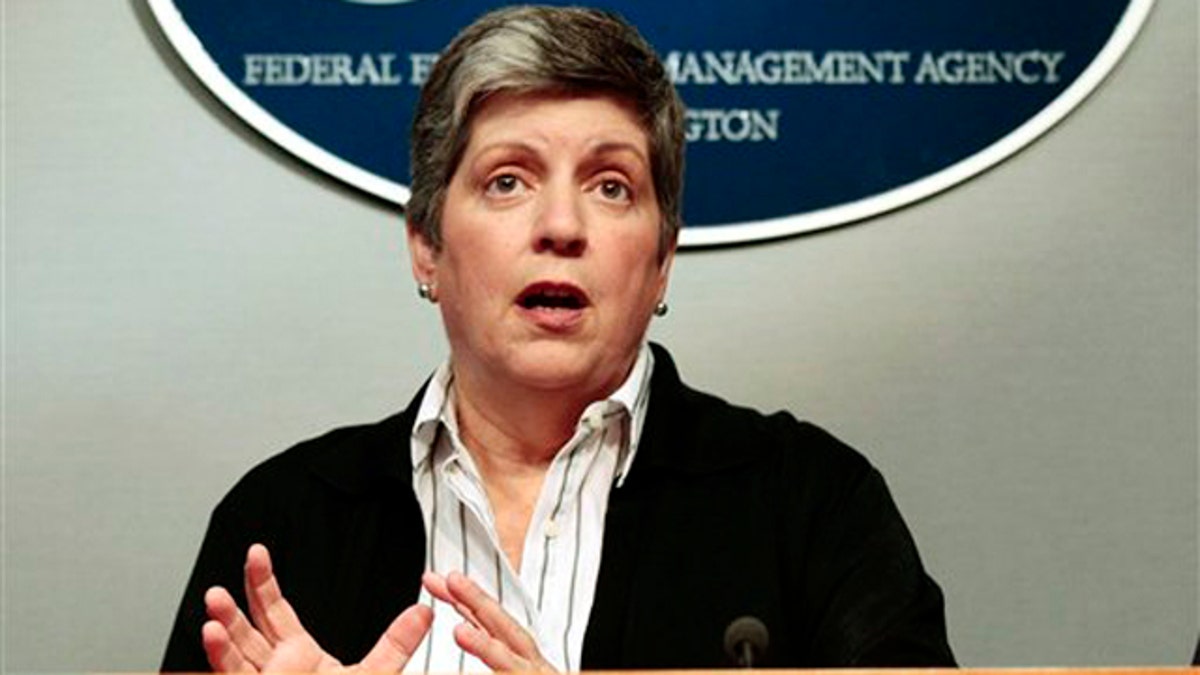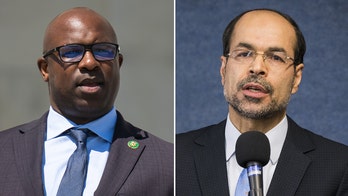
Homeland Security Secretary Janet Napolitano speaks at FEMA headquarters in Washington Aug. 28. (AP)
As the country marks 10 years since Sept. 11, 2011, the biggest federal bureaucracy to emerge from the ashes of the terror attacks -- the Department of Homeland Security -- is facing budget cuts for the first time.
The nearly nine-year-old agency, one of the country's largest Cabinet departments, has grown year-after-year since its inception, but as lawmakers look to pare down the federal budget in the wake of massive deficits, DHS is no exception on the chopping block.
The cuts started earlier this year, as lawmakers pared down the agency as part of broader negotiations over the 2011 budget. As belated sessions get underway for next year's budget, lawmakers are looking to cut into homeland security funding once more.
Lawmakers are offering modest cuts. The House-passed appropriations bill for fiscal 2012 would cut spending by 2.6 percent from the last budget -- 7 percent below the president's request. The Senate unveiled its version Tuesday, cutting slightly less.
But that's a turnaround from the last eight years, when the department's basic discretionary budget ballooned by more than 40 percent.
Sen. Dan Coats, R-Ind., summing up the attitude of lawmakers looking to downsize, said Tuesday that Congress is going to have to "triage" to sort out what's needed, and what's not, in the homeland security budget. He said the country continues to face terrorist threats, but also faces the "threat of growing red ink."
"Cost constraints will probably require that we do less than we probably would like," Coats said.
As the Senate starts to tackle next year's homeland security budget, a Senate committee held a separate hearing Wednesday on the "reforms and challenges ahead" at the department. There, Deputy Secretary Jane Holl Lute defended the department's progress, saying it has built a "more ready and resilient nation" prepared to respond to disasters and emergencies.
Government Accountability Office Comptroller Eugene Dodaro praised the department for implementing many improvements over the past decade but said "gaps and weaknesses" remain, issuing a report highlighting those gaps.
Since its formation, DHS has come under criticism from liberals and conservatives alike as too vast, too unwieldy and too inefficient. But lawmakers are not looking at any drastic overhauls like splitting up the department.
The department of 230,000 employees has absorbed agencies tasked with everything from border security to disaster response. They include the Transportation Security Administration, U.S. Customs & Border Protection, U.S. Citizenship and Immigration Services, U.S. Immigration and Customs Enforcement, U.S. Secret Service, the Federal Emergency Management Agency, and the Coast Guard.
In moving to halt government growth, the House Appropriations Committee earlier this year cut programs it claimed had underperformed or been poorly managed. At the top of the list were grant programs -- particularly grants handled by FEMA. The House bill cut grant funding by $2.1 billion and called for more oversight.
The bill gives a glimpse into how lawmakers view the various subsections of DHS. It included a modest increase over last year's level for the TSA, but did not provide President Obama everything he wanted -- particularly money for hundreds of new high-tech scanners and hundreds of new workers to operate them. TSA has come under fire for screening techniques some say are excessive. Complaints about the agency have led to the unflattering nickname, "thousands standing around." Sen. Susan Collins, R-Maine, at the hearing Wednesday, complained that young and elderly passengers are still subjected to "intrusive" screening, while dangerous individuals are slipping through the cracks.
Meanwhile, CBP was awarded $443 million over the prior budget, reflecting a desire to beef up the agency with funding for more border patrol agents, canine units and other assets.
A House Appropriations Committee aide said the bill "makes necessary cuts in smart places" while preserving what matters most.
Chris Edwards, editor of the DownsizingGovernment website for the Cato Institute, said the department is getting caught up in deficit-reduction fever but also feeling the consequences for a series of "boondoggle stories" over the years.
"It's not known as being an efficiently run department," he said.
A report coming out later this week by fellow Cato scholar David Rittgers -- which calls for breaking apart the department into more "practical groupings" -- cited several of those incidents, including a California center that used DHS money to get 55 large-screen TVs for a new training system but did not get the training software, and an Ohio county that bought a HAZMAT trailer with DHS money and then sold it.
The report also noted that the department's 22 agencies operate out of 70 buildings across the nation's capital.
The department is trying to partially consolidate that office space and workforce with a new headquarters. However, Sen. Joe Lieberman cautioned earlier this year that the budgets under consideration could put that project at risk.
He and other lawmakers have warned that Congress is in danger of going too far in cutting homeland security. Lieberman, I-Conn., in a letter earlier this year, said the cuts would "severely diminish our national preparedness."
Sen. Mary Landrieu, D-La., whose subcommittee was reviewing the appropriations bill Tuesday, said lawmakers have to make "tough choices" but likewise cautioned against cutting too much.
The Senate bill proposes cutting less than the House version. The Senate bill would total $41 billion, which is $666 million below the fiscal 2011 budget but $408 million above what the House approved.
Asked how the department would defend itself, a senior DHS official declined to comment on the pending legislation. But a Landrieu spokeswoman said some of the House cuts are "short-sighted."
"(Landrieu will) work to make sure significant funding is there for disaster preparedness and response," she said.
While lawmakers look to pare back the overall DHS budget, some are making a renewed fight to preserve FEMA funding in the wake of Hurricane Irene and other natural disasters. Senate Democrats on Tuesday called for providing $6 billion in disaster relief, to cover hurricane damage as well as damage from floods and tornadoes.
The bill also calls for more grant money than is included in the House bill.




